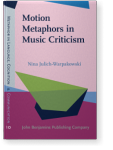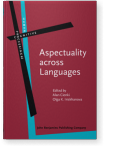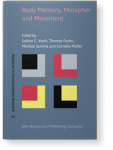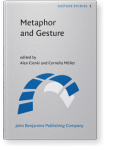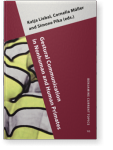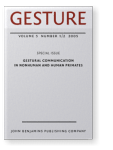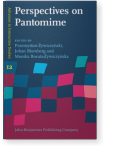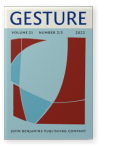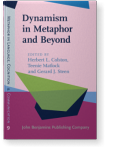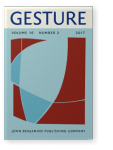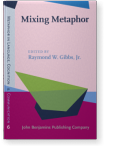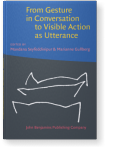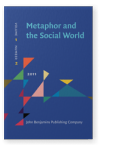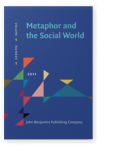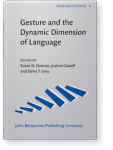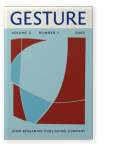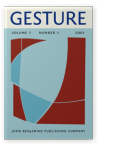Cornelia Müller
List of John Benjamins publications for which Cornelia Müller plays a role.
Book series
Aspectuality across Languages: Event construal in speech and gesture
Edited by Alan Cienki and Olga K. Iriskhanova
[Human Cognitive Processing, 62] 2018. xviii, 221 pp.
Subjects Cognition and language | Gesture Studies | Semantics | Syntax | Theoretical linguistics
Body Memory, Metaphor and Movement
Edited by Sabine C. Koch, Thomas Fuchs, Michela Summa and Cornelia Müller
[Advances in Consciousness Research, 84] 2012. vii, 468 pp.
Subjects Cognition and language | Consciousness research | Gesture Studies
Metaphor and Gesture
Edited by Alan Cienki and Cornelia Müller
[Gesture Studies, 3] 2008. ix, 306 pp.
Subjects Cognition and language | Gesture Studies
Gestural Communication in Nonhuman and Human Primates
Edited by Katja Liebal, Cornelia Müller and Simone Pika
[Benjamins Current Topics, 10] 2007. xiv, 284 pp.
Subjects Cognition and language | Cognitive psychology | Evolution of language | Gesture Studies | Signed languages
Gestural Communication in Nonhuman and Human Primates
Edited by Katja Liebal, Cornelia Müller and Simone Pika
Special issue of Gesture 5:1/2 (2005) 324 pp.
Subjects Cognitive psychology | Communication Studies | Signed languages
2024 Chapter 9. Gestural mimesis as “as-if” action Perspectives on Pantomime, Żywiczyński, Przemysław, Johan Blomberg and Monika Boruta-Żywiczyńska (eds.), pp. 217–241 | Chapter
It is argued that gestural mimesis involves “as-if” actions that explain the transition from practical and literal actions with the hands to communicative actions of the hands. Concerning the term and the concept “pantomime,” it is suggested that it be primarily reserved for artistic practice… read more
2022 Obituary: Adam Kendon 1934–2022 Gesture 21:2/3, pp. 157–166 | Obituary
2022 Feeling for speaking: How expressive body movements ground verbal descriptions of emotions Dynamism in Metaphor and Beyond, Colston, Herbert L., Teenie Matlock and Gerard J. Steen (eds.), pp. 77–94 | Chapter
In this paper, attention is drawn to the embodied experiences that are mobilized when speakers are asked to describe emotions. By analyzing how people use expressive body movements and language when thinking and speaking about emotion concepts, light is thrown on “People’s subjective, felt… read more
2018 Ways of expressing action in multimodal narrations – the semiotic complexity of character viewpoint depictions Linguistic Foundations of Narration in Spoken and Sign Languages, Hübl, Annika and Markus Steinbach (eds.), pp. 223–250 | Chapter
Based on an analysis accounting for the whole body as a possible articulator in the depiction of actions, this chapter argues for an expansion of the notion of ‘character viewpoint gestures’ to a notion of ‘multimodal action depiction from a character viewpoint’. Our study shows that speakers may… read more
2017 How recurrent gestures mean: Conventionalized contexts-of-use and embodied motivation Gesture 16:2, pp. 277–304 | Article
Drawing upon corpus analyses of recurrent gestures, a pragmatics perspective on gestural meaning and conventionalization will be developed. Gesture pragmatics is considered in terms of usage-based, embodied and interactively emerging meaning. The article brings together cognitive linguistic,… read more
2016 Chapter 3. Why mixed metaphors make sense Mixing Metaphor, Gibbs, Jr., Raymond W. (ed.), pp. 31–56 | Article
This paper explores why speakers and addressees seem to have no problem in making sense of mixed metaphors. We will argue that the mixing of metaphors reveals something about the nature of conventionalized metaphoric meaning that is as interesting for cognitive linguists as speech errors are for… read more
2014 Gesture as “deliberate expressive movement” From Gesture in Conversation to Visible Action as Utterance: Essays in honor of Adam Kendon, Seyfeddinipur, Mandana and Marianne Gullberg (eds.), pp. 127–152 | Article
This chapter offers an in-depth exploration into one of Adam Kendon‘s core theoretical assumptions: gesture as “deliberate expressive movement.” Gestures are recognized as such because they show certain characteristic features of form, because they have “features of manifest deliberate… read more
2012 Chapter 13. Body memory and the emergence of metaphor in movement and speech: An interdisciplinary case study Body Memory, Metaphor and Movement, Koch, Sabine C., Thomas Fuchs, Michela Summa and Cornelia Müller (eds.), pp. 201–226 | Article
The present study is an empirical documentation of body memory and the transition from implicit to explicit memory from the cognitive-linguistic, movement analytic, and philosophical perspectives in a therapeutic application. The transition from implicit memory to explicit memory is described using… read more
2012 Chapter 26. Body memory: An integration Body Memory, Metaphor and Movement, Koch, Sabine C., Thomas Fuchs, Michela Summa and Cornelia Müller (eds.), pp. 417–444 | Article
In this final chapter, we summarize the state of the art concerning the research on body memory in phenomenology, in the cognitive sciences, and in embodied therapies. Thereby, we show the impact of the studies collected in this volume for the development of the research in these three fields.… read more
2011 Embodied meaning construction: Multimodal metaphor and expressive movement in speech, gesture, and feature film Metaphor and the Social World 1:2, pp. 121–153 | Article
In this article, we argue that multimodal metaphors are grounded in the dynamics of felt experiences. Felt experiences are inherently affective, with immediate sensory qualities and an affective stance. We suggest that as such, they ground the emergence and activation of metaphors. We illustrate… read more
2008 Introduction Metaphor and Gesture, Cienki, Alan and Cornelia Müller (eds.), pp. 1–4 | Miscellaneous
2008 What gestures reveal about the nature of metaphor Metaphor and Gesture, Cienki, Alan and Cornelia Müller (eds.), pp. 219–245 | Article
Studying gestures in language use offers the opportunity to uncover fundamental properties of metaphor which so far have received little interest – if at all. This is a shift towards studying metaphor as it is used, and it has important theoretical consequences because it reveals that metaphoricity… read more
2007 Introduction: Gestural communication in nonhuman and human primates Gestural Communication in Nonhuman and Human Primates, Liebal, Katja, Cornelia Müller and Simone Pika (eds.), pp. 1–4 | Article
2007 Gestures in human and nonhuman primates: Why we need a comparative view Gestural Communication in Nonhuman and Human Primates, Liebal, Katja, Cornelia Müller and Simone Pika (eds.), pp. 237–260 | Article
The present article offers a condensed overview, of why a comparative view on gestures in human and nonhuman primates may offer important insights to both: researchers of human as well as of nonhuman primates. It is argued that a comparative view may further contribute to the debate over the… read more
2007 10 A Dynamic View of Metaphor, Gesture and Thought Gesture and the Dynamic Dimension of Language: Essays in honor of David McNeill, Duncan, Susan D., Justine Cassell and Elena T. Levy (eds.), pp. 109–116 | Chapter
2005 Introduction: Gestural communication in nonhuman and human primates Gestural Communication in Nonhuman and Human Primates, Liebal, Katja, Cornelia Müller and Simone Pika (eds.), pp. 1–5 | Article
2005 Gestures in human and nonhuman primates: Why we need a comparative view Gestural Communication in Nonhuman and Human Primates, Liebal, Katja, Cornelia Müller and Simone Pika (eds.), pp. 259–283 | Article
The present article offers a condensed overview, of why a comparative view on gestures in human and nonhuman primates may offer important insights to both: researchers of human as well as of nonhuman primates. It is argued that a comparative view may further contribute to the debate over the… read more
2002 A brief history of the origins of The International Society for Gesture Studies (ISGS) Gesture 2:1, pp. 127–132 | Miscellaneous
2001 Introducing GESTURE Gesture 1:1, pp. 1–7 | Miscellaneous
